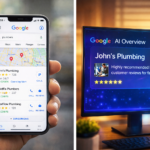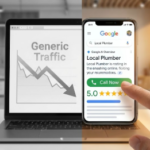When people search on Google, they’re trying to find something — fast.
Maybe they want to buy something, maybe they’re looking for help, or maybe they just want an answer to a question. But here’s the thing: Google pays attention to what kind of question is being asked.
If you’re a small business owner, you need to know how to use the right keywords that match what people are searching for. This is called search intent — and it’s a big deal for SEO.
At Business Solutions Marketing Group, we help small businesses like yours grow online. One of the biggest secrets? Understanding how keywords and search intent work together.
Let’s break it down in simple terms.
🔍 What Are Keywords?
Keywords are the words people type into Google. It can be one word, like “plumber,” or a phrase like “best plumber near me.”
There are four main types of keywords — and they each connect to different search intent.
🧠 What Is Search Intent?
Search intent is the reason behind the search.
Think of it like this: If someone types “buy tennis shoes size 9,” they’re ready to shop. But if they type “how to clean white tennis shoes,” they’re just looking for help.
Google wants to match the search to the best possible answer. So if your website has the right keywords that match that search intent, you’re more likely to show up.
📚 The 4 Types of Keywords (And Their Search Intent)
1. Informational Keywords
These are used when someone wants to learn something.
✅ Examples:
- “how to fix a leaking faucet”
- “what is local SEO”
- “best ways to get Google reviews”
🧠 Search intent: They want information, not to buy (yet!).
📊 Stat: According to SEMrush, 80% of all Google searches are informational. That’s huge! You can bring people to your site just by teaching something helpful.
2. Navigational Keywords
Used when someone is looking for a specific website or brand.
✅ Examples:
- “Facebook login”
- “Starbucks near me”
- “Business Solutions Marketing Group reviews”
🧠 Search intent: They already know what they want and are trying to get there fast.
💡 Pro Tip: Make sure your Google Business Profile and website match your brand name exactly — this helps with these types of searches.
3. Transactional Keywords
These are used when someone wants to take action, like make a purchase, call a business, or schedule something.
✅ Examples:
- “book dentist appointment Las Vegas”
- “buy SEO software monthly plan”
- “best hair salon near me with online booking”
🧠 Search intent: They’re ready to go! These are the money-making keywords.
📊 Underrated Stat: WordStream reports that long-tail transactional keywords convert 2.5x higher than general terms. That’s why targeting phrases like “emergency electrician in Miami” beats just using “electrician.”
4. Commercial Keywords (a.k.a. Research or Comparison Keywords)
People use these when they’re thinking about buying, but still deciding.
✅ Examples:
- “top-rated pest control companies”
- “best CRM for small business”
- “Shopify vs. Wix for online store”
🧠 Search intent: They want reviews, comparisons, or more info before they commit.
📊 Stat: Google says 53% of buyers always do research before purchasing, even for small purchases. That’s why blogs and review content work so well.
🎯 How to Use These Keywords in Your Marketing
Now that you know the types of keywords and the search intent behind them, here’s how to use them:
✅ On Your Website Pages
Use transactional and commercial keywords on your service and product pages. These are the people ready to call or buy.
✅ On Your Blog
Write helpful blogs using informational keywords. Answer common questions your customers have. This builds trust and helps your SEO.
✅ On Your Homepage & About Page
Use navigational keywords like your business name, city, and brand terms to help people find you directly.
📈 Why This Matters for SEO
Google is smarter than ever. It looks at:
- What your page says
- What the searcher wants
- And how well they match
If you use the right type of keyword with the right kind of intent, Google is more likely to show your website to the right people.
And when you match intent? You get more traffic, more trust, and more sales.

💡 Final Thoughts from Linda
At Business Solutions Marketing Group, we’ve seen time and time again how understanding keyword types can transform a small business’s online presence.
You don’t need to know fancy marketing words. You just need to understand what your customer wants — and speak their language on Google.
That’s where the magic happens.
📞 Want help finding the right keywords for your business?
Let’s talk strategy that actually works.







